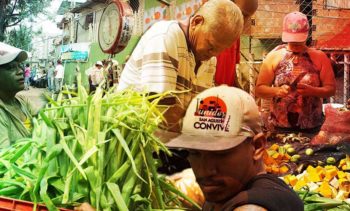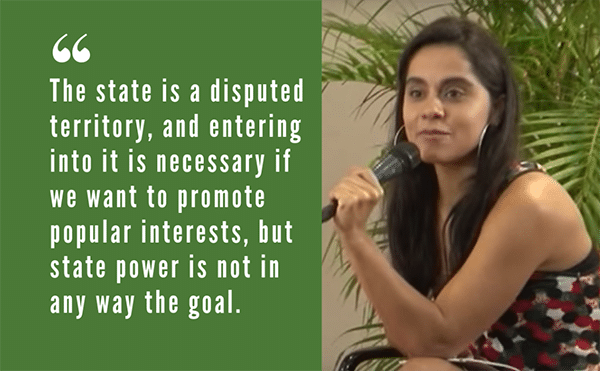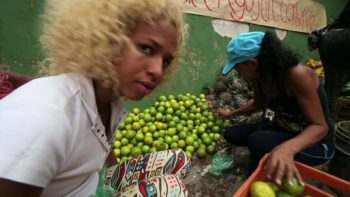Martha Lia Grajales is part of the Surgentes Collective (a human rights organization) and a founding member of the San Agustin Convive cooperative. She is a lawyer, holding a master’s in human rights and democracy. In this interview, we ask her questions about the dialectic between state power and popular organization, with a view to understanding how grassroots initiatives might breath new life into the socialist project.
From the beginning, the Chavista movement had two ways of understanding and carrying out politics: on the one hand, there was popular protagonism, direct democracy and grassroots organization. On the other hand, Chavismo also pursued state and institutional power. This double approach was productive for a time, and it opened the way for unforeseen expressions of popular power. Now, however, there seems to be a clear prevalence of state-level politics over popular power and grassroots organization. What’s going on?
The state is a disputed territory, and [entering into it] is necessary if we want to promote popular interests, but state power is not in any way the goal. In any effort to build popular power, there must be synergy between the bottom and the top. The key issue here is that what is done “from above” must strengthen popular power from below.
We can’t ignore the important role that the government has had in fostering spaces of participation and political organizing for subaltern groups. The breadth and magnitude of popular organization in Venezuela is, without a doubt, one of the Chavista government’s goals, and we can count grassroots organization on a large scale as one of its big successes.
What is the problem then? First, the work that is done “from above” should not replace or appropriate that which comes “from below.” That’s to say, institutions shouldn’t manage or instrumentalize popular power.
There are many conceptions of popular power, and one of them considers it as simply as an instrument for seizing [state] power. However, once the power is in your hands, then you appeal to “historical necessity” and “national interest” to justify centralizing power. In this way, the party and the state can come to supplant popular projects and their autonomous organization of the oppressed classes.
The other conception of popular power, which is the one we believe in, assumes popular power to be both a means and an end. Popular power is about creating a new set of social relations that are outside the logic of capital, and the aim is self-government. Chávez warned that the state or party should not institutionalize or coopt popular power. That, obviously, does not mean we should take an essentialist attitude and cut off all relations with the state for fear of losing autonomy. As I said earlier, the state is a disputed terrain which the popular movement must not ignore, but it shouldn’t be considered the main objective.
Thus, the problem is not that popular power has been promoted from above. The problem is that often those operating in the government conceive popular power as something that is merely instrumental and which is only good for maintaining [formal or traditional] power. This conception strips popular power of all of its transformative potential. It treats the masses as passive recipients rather than as political subjects with the capacity and power to guide the revolutionary process.
But it should be said that this is not only a question about how the state does things. Popular forces also need to problematize their approach, meaning above all that they need to develop economic autonomy, which not only politicizes their movements but also limits the possibility of state cooptation.
A popular movement that does not have its own economic muscle and depends completely on state resources is very vulnerable. If it does not behave as the state expects it to, it will lose support and its organizational work can easily collapse. Or when the government, wanting to support the initiative, is lacking in resources, that can also lead to the collapse of the movement’s organizational efforts. So when popular power builds a relationship of dependence on the state, that cuts back its capacity to self-govern.
Obviously, all this doesn’t mean that popular organizations should reject tate support, but it does mean that when support is received, it must be oriented toward collectively developing and appropriating the means of production according to a logic that is different from capital, and which must be sustainable without the state’s intervention. Otherwise it will be impossible to advance on the path of self-government and transitioning to socialism.
This is a complicated business, because here the government must support the initiatives for building of popular power that should gradually replace the government itself. In that process, we will naturally run into resistance from constituted power, which does not want to be replaced. However, it is only if this transfer of power takes place, that we can advance toward socialism.
The role of a popular government is to contribute to building power from below, fostering a constant modification of relations of force in favor of the people. There must be a process of permanently generating conditions for the growth of popular power. Paraphrasing [Miguel] Mazzeo: those from above should foment, not replace popular power.
In this interview, we focus on grassroots-level organization. Depicted here is a food distribution operation organized by the San Agustin Convive cooperative. (Supuesto Negado)

In this interview, we focus on grassroots-level organization. Depicted here is a food distribution operation organized by the San Agustin Convive cooperative. (Supuesto Negado)
You have claimed that the Chavista popular movement needs to organize all of its forces, with the aim of reorienting the Bolivarian Process. The popular movement–consisting of people organized in communes, cooperatives, worker councils, and autonomous feminist organizations–must become something that can guide the masses. This requires a great deal of collective work but also, and very importantly, an effective communications strategy.
The crisis in Venezuela is much more that a struggle to maintain state power. It is about the struggle to maintain socialism as a strategic goal, not only in Venezuela but in the continent as a whole.
In this regard, in the midst of the brutal blockade and with internal errors having been made in the direction of the political process, there is now a strong national and international tendency claiming that Venezuela’s attempt to build an alternative to capitalism was a huge failure. Moreover, it is said that problems that we are now experiencing are associated with the socialist model. It’s about burying socialism as an alternative to capitalism, associating it with scarcity of food, widespread impoverishment, the restriction of political rights, corruption, etc.
So when I talk about the need for the Chavista popular movement to take a position, I’m talking about making visible all those grassroots projects that have taken shape during the emergency–all those communal projects that, in the midst of this crisis, cast their lot with building alternatives to capitalist relations, to colonialism and to heteronormativity –, and in that way point to socialism as a strategic horizon.
In the midst of this profound crisis, these grassroots efforts expand and enrich participation in politics. They also produce and guarantee food in a sustainable and sovereign way. In other words, those who are self-organized and collectively manage shared assets are more protected. These grassroots experiences are living proof that the socialist model hasn’t failed. Quite the contrary, these projects go to show us that the way out of the current crisis involves placing our bets on a truly emancipatory course of action.
The numbers show this. Plan Pueblo a Pueblo is a project involving some seventy small campesinos–essentially farming families–and it manages to distribute food to more than 1,200 [urban] families weekly. In three years, they have produced more than 1,000 tons of fruits and vegetables on their own. They are also recovering native seeds and agroecological practices, while promoting campesino organization not only for the sake of food sovereignty, but also with a view to distributing independently. This initiative generates new fraternal relations between the people of the countryside and the city, and productive relations geared toward common welfare and toward eliminating intermediaries.
Pueblo a Pueblo’s internal organizational process helped raise the small farmers’ capacity to grow and distribute in an independent and autonomous manner, which in turn helped them get better pay for their labor. At the same time, the organized communities are able to purchase produce with around 60% savings when compared with standard market prices. All this happened in the midst of a terrible crisis, and it was made possible, first, by planning production; second, through the organizational work both in the countryside and in the city; and, third, by eliminating intermediaries from the productive chain. This shows that organization can help us overcome the crisis, but it’s also a game-changer, allowing us to avoid capitalist pragmatism, and deepening our commitment to socialism as a strategic goal.
So we have to question both the usual explanation of the causes of the harsh situation that we are currently facing and at the same time make visible all those practices that are led by subaltern groups: projects that will allow us to find a way out of this crisis while radicalizing the process.
This, however, requires a big effort on the part of the popular movement to generate spaces of articulation. That’s because, whenever these initiatives get going, pragmatists will always say that with one truck of produce, four kilos of potatoes or a pair of panties [produced by a cooperative] will not solve the huge difficulties that we are living.
When faced with these arguments, I would answer in two ways. First, this is not only about the collective effort that is promoted at a local level, because without a doubt this effort taken in isolation is absolutely insufficient. The aim here is to multiply the local productive projects based on the characteristics of each territory and what is needed for reproducing life there. The local projects should also be linked to others such projects, allowing for the growth of what Chavez called a great spider web: a new geometry of power. This new power might well have its epicenter in the territory–that is, at the local level–but its true power consists in the capacity to connect people and communities. It’s in this way that, what might seem insignificant at a local level, can contribute to new practices, new policies, new economic relations, which could meet people’s most serious needs.
Thus, the objective is not only generating local productive projects. It is also to generate spaces of encounter, articulation and collective action that must be promoted beyond the local level in which each initiative takes place.
I would also add something in response to those who think it’s naïve to imagine solving crisis from below, from the local level, and step by step. Well, we are not naïve and are not forgetting about the struggle that must take place on the level of state politics. But it is precisely by accumulating force–through organizational work and forging alternative productive chains–that we can have real capacity to exert our influence on the level of state politics.
In the face of the crisis (and governmental responses that often involve reducing popular participation) new grassroots projects have been emerging. These projects are often self-managed and try to solve problems outside the logic of capital. We have seen people using new organizational forms that are much more democratic and horizontal. These spaces have been important for repolitizing people during the crisis and in the face of imperialist aggression.
As a result of the multi-dimensional crisis that we are facing in Venezuela, many people from the popular classes no longer involve themselves in [state-sponsored] organizations. In some cases, this is due to their understandably critical position in regards to the government–both with the national direction and its local representatives in the territory, particularly the people assigned from above to head the CLAP [Local Food Production and Provision Committees, which organize de distribution of subsidized food] or the UBCh [Bolivar-Chavez Battle Units, which are the basic organizational structures of the PSUV at a local level]. In other cases, it’s simply because solving day-to-day problems takes a lot of time and effort [due to the crisis].
However, it’s different a different story with the organizational efforts that have been able to respond to the crisis with projects that operate outside the logic of capital (addressing people’s material needs, such as food), and have done this with a practice that turns people into protagonists and political subjects again, as opposed to the clientelistic logic promoted by the government; in the projects that question the logic of privileges in the distribution of scarce resources; in the initiatives that promote relationships built on transparency and equality. These kinds of organizational initiatives have managed to maintain themselves and grow, not only from an economic standpoint, but also politically. These organizations have not only survived, they also have been growing and getting stronger.
This shows that it’s not just about solving the food issue (which is what the CLAP tries to do), but also about doing this in ways alternative to the logic of capital, through methods that are collective and democratic. In the words of Mazzeo, it’s about government by an entire class and not by an elite.

San Agustin Convive as it organizes for the Pueblo a Pueblo food distribution operation. (Maureen Riveros)
Those efforts seeking to build popular power from below–and that do so by developing forms that allow for a more collective and democratic way of doing politics, while also addressing people’s material needs–work to re-politize the population and raise morale. This recharges and strengthens the mass organization, while maintaining socialism as a strategic horizon. Even though they don’t actually get us to socialism, they work to build conditions for it.
Finally, I would like to ask you about Unidos San Agustin Convive, as a concrete self-organized project. If you could describe it, that would help us to understand the experience and its political reverberations. However, we would also like to learn how this experience repolitizes people and raises morale, and how it belies the claim that socialism has failed and the only solution now is privatization.
San Agustín Convive is a cooperative formed mainly by women from thirteen communal councils in the San Agustin del Sur barrio [Caracas]. It got going in August almost three years ago. The cooperative took shape to deal with the issue of food. When it started in 2016, there was one hub made up of five communal councils, and now there are three hubs bringing together people from 13 communal councils. Besides the distribution of food in collaboration with the Plan Pueblo a Pueblo, the cooperative is also taking steps to develop textile and food production; the making of sauces, jams, and ice cream; and children’s social and leadership activities–all this through a self-managed and deeply democratic process involving collective organizational forms. It is an attempt to develop revolutionary theory through practical work. Thus, it is not just an effort aiming to meet specific demands, it is also about building the conditions for socialism to take shape beginning at a local level.
How does it repolitize and remobilize people? Well, it re‐politicized people through a practical experience demonstrating that cooperative and collective action can protect us, in the midst of Venezuela’s deep crisis. Thanks to the organizational work we have done, people in the cooperative have access to food with more than 60% savings compared with the regular market prices (which, in turn, means that we are likely to be eating more and better). The cooperative also decreases our level of dependence, making us more autonomous and less vulnerable. Finally, the experience demonstrates, in the midst of a brutal crisis, that the only way out is through collective projects, not through capitalism.
The project remobilizes us because, for that [non‐capitalist] alternative to be possible, we have had to overcome the condition of being merely dependent “recipients” and remake ourselves as political subjects capable of critically addressing our reality and of organizing to transform it. It is not about waiting for the solutions to arrive from above, it is about building them from below. Of course, for something like this to work, everybody has to participate and get involved.


